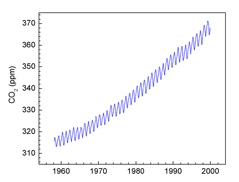Greens co-leader says being centrist is blah
In a recent interview with 95 bFM, Greens co-leader Rod Donald had this to say about being centrist:
"Well, being centrist is being blah from our point of view. I mean, I'm not interested in being a nothing. We want to stand tall on what we believe in. Sometimes those policies are popular; sometimes they're not. And over time, our positions become mainstream. Thirty years ago, if you'd talked wind turbines, people would have laughed at you. What's happening now? Most of the new energy projects are wind energy projects. It's the same with energy efficiency and solar water heating and rail. All those types of initiatives. Concerns about the environment generally are much more in vogue than they were when I started out in Values 31 years ago. I'm not about to sell my principles just to get the baubles of power." - Rod Donald.
I find it hard to disagree with Rod on most of this. Selling your principles for the 'baubles of power" does not sound cool to me either. I guess its just a question of what exactly are the Green party principles, focus and priorities? One of my associates from Oxford recently had this to say about his opinion on a reasonable set of principles for the Green party:
The Greens should "develop a tight focus on scientifically strong and politically relevant policies, and ... by reducing waste, eliminating perverse subsidies and creating opportunities for new eco-industries".
This sounds like a good starting point to me. I think that most would probably agree that the Green Party have at least tried to do something on the specific policies of reducing waste, eliminating perverse subsidies and creating opportunities for new eco-industries. But what about the overall approach as a party? Is the current Green party scientifically strong and focused on politically relevant issues? Or do they tend to tackle too many small and disparate issues. Are they always backing their positions with science, where science is relevant?
Scientifically strong!
I am a scientist. Some of us scientists still have principles, even in the morally bankrupt times we live in. One of the biggest things lacking in political discourse as far as I can see is scientifically sound, reasoned argument and a basic understanding of statistics. Too many issues are pursued with emotional fervour (nothing wrong with emotion!) but without any sound reasoning. For instance, acknowledging that marijuana use (on the current balance of evidence!) contributes to mental illness in teenagers. The scientific evidence for this is steadily growing. Of course, how you use this information to inform policies is another thing altogether. But it is not only important to understand, as a policymaker, the science, but also to communicate those principles of evidence and reason to the general population.
Politically relevant
As a small party, should the Greens be spending their time focusing on things like child smacking laws? Arguably, it is a worthwhile cause, but the planet is getting smacked much harder than our children are. Priorities are important. If the Green party maintains a focus on sensible environmental policy, the public will follow them. I am not suggesting that the Green party changes its principles, I am suggesting that the Green party re-assesses its priorities and the means by which it communicates those priorities to the public. As Rod correctly points out, environmentalism and clean energy are now mainsteam. Why isn't the Green party? Since the Green party is the only party that can make a clarion call for global environmental sustainability - shouldn't that be their number one priority?! In the same interview, Rod Donald himself says:
"There is some pretty radical change that needs to take place if we're actually going to save this place. That might sound over the top, but you've just got to look around you to see what we're doing to this earth, and it can't cope with much more abuse."
I couldn't agree more.
"Well, being centrist is being blah from our point of view. I mean, I'm not interested in being a nothing. We want to stand tall on what we believe in. Sometimes those policies are popular; sometimes they're not. And over time, our positions become mainstream. Thirty years ago, if you'd talked wind turbines, people would have laughed at you. What's happening now? Most of the new energy projects are wind energy projects. It's the same with energy efficiency and solar water heating and rail. All those types of initiatives. Concerns about the environment generally are much more in vogue than they were when I started out in Values 31 years ago. I'm not about to sell my principles just to get the baubles of power." - Rod Donald.
I find it hard to disagree with Rod on most of this. Selling your principles for the 'baubles of power" does not sound cool to me either. I guess its just a question of what exactly are the Green party principles, focus and priorities? One of my associates from Oxford recently had this to say about his opinion on a reasonable set of principles for the Green party:
The Greens should "develop a tight focus on scientifically strong and politically relevant policies, and ... by reducing waste, eliminating perverse subsidies and creating opportunities for new eco-industries".
This sounds like a good starting point to me. I think that most would probably agree that the Green Party have at least tried to do something on the specific policies of reducing waste, eliminating perverse subsidies and creating opportunities for new eco-industries. But what about the overall approach as a party? Is the current Green party scientifically strong and focused on politically relevant issues? Or do they tend to tackle too many small and disparate issues. Are they always backing their positions with science, where science is relevant?
Scientifically strong!
I am a scientist. Some of us scientists still have principles, even in the morally bankrupt times we live in. One of the biggest things lacking in political discourse as far as I can see is scientifically sound, reasoned argument and a basic understanding of statistics. Too many issues are pursued with emotional fervour (nothing wrong with emotion!) but without any sound reasoning. For instance, acknowledging that marijuana use (on the current balance of evidence!) contributes to mental illness in teenagers. The scientific evidence for this is steadily growing. Of course, how you use this information to inform policies is another thing altogether. But it is not only important to understand, as a policymaker, the science, but also to communicate those principles of evidence and reason to the general population.
Politically relevant
As a small party, should the Greens be spending their time focusing on things like child smacking laws? Arguably, it is a worthwhile cause, but the planet is getting smacked much harder than our children are. Priorities are important. If the Green party maintains a focus on sensible environmental policy, the public will follow them. I am not suggesting that the Green party changes its principles, I am suggesting that the Green party re-assesses its priorities and the means by which it communicates those priorities to the public. As Rod correctly points out, environmentalism and clean energy are now mainsteam. Why isn't the Green party? Since the Green party is the only party that can make a clarion call for global environmental sustainability - shouldn't that be their number one priority?! In the same interview, Rod Donald himself says:
"There is some pretty radical change that needs to take place if we're actually going to save this place. That might sound over the top, but you've just got to look around you to see what we're doing to this earth, and it can't cope with much more abuse."
I couldn't agree more.



2 Comments:
At 8:12 AM, dc_red said…
dc_red said…
Policy-making on a strong scientific basis, eh? Nice in principle, cat amongst the pigeons in practice. In fact, a verocious, starved, malicious wolf amongst juicy newborn lambs in principle.
For example, a very strong case could be built in about - oh, 5 minutes - for building almost no new roads. Instead of 85% of transport money going to roads and their maintenance, we could argue "on current evidence", that this proportion should go to public transport and intitiatives to support walking and cycling. This would go down like a lead balloon.
Interesting to ponder why green ideas are mainstream while the green party is often viewed as a pariah.
This said, your example of marijuana is somewhat odious: what of the (overwhelming?) evidence to suggest that the two most harmful (socially, physiologically) drugs are the two which are legal in most societies: alcohol and tobacco?
At 9:00 AM, Alexei said…
Alexei said…
dc_red:
I agree that alcohol and tobacco are also harmful. These issues are hard to tease apart. I personally like alcohol (in moderate doses) and am averse to tobacco by and large. It is an interesting question, as to what is worse, an middle- to late-aged adult with lung cancer or a teenager with schizophrenia? These are ethical questions that can not be answered by science, but whose answers must be supported by the relevant scientific evidence.
Post a Comment
<< Home